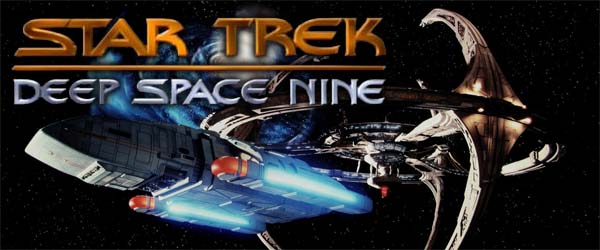
In the age of streaming and binge-watching here in the year 2023, long-form serialized television is now ubiquitous. Every network and streaming service has wanted its own blockbuster TV shows. Whether it's AMC's The Walking Dead and Breaking Bad, HBO's Game of Thrones, Sci-Fi's Battlestar Galactica, Netflix's House of Cards and Stranger Things, History's Vikings, and so forth, it seems that every big new show outside of sit-coms has a heavily-serialized format. Procedural dramas are going the way of the dinosaur.
Serialized, long-form television may be commonplace now, but back in the 1990's, it was virtually unheard of outside of daytime soap operas (such as Dallas and Dynasty) and the occasional network mini-series. At least, this was the case in the United States. British television has a much longer track record of serialized story-telling. A big part of why serialized television was uncommon was that the producer(s) of network syndicacted shows didn't have as much control over when its affiliates decided to air the shows, or how heavily they would market and advertise it. Furthermore, the networks or affiliates could change the time slot of the show pretty much at a whim. Viewership, therefore, would be much more fickle and fractured. Audiences would pop in and drop out. Expecting the audience to have seen every previous episode in preparation for this week's episode was a dangerous and risky expectation for a production studio. It's easy to lose viewers if none of them know what's going on.
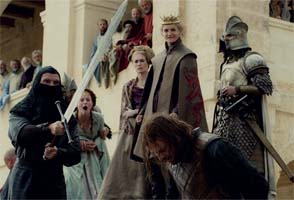 - Game Of Thrones, copyright HBO
- Game Of Thrones, copyright HBO
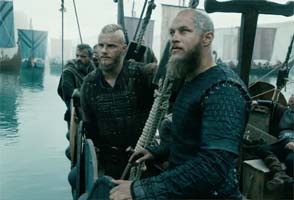 - Vikings, copyright History Channel
- Vikings, copyright History Channel
Highly serialized, long-form drama are the norm for modern networks and subscription television services.
As I mentioned in the previous essay, this was the case with me. I was in elementary school and middle school during DS9's run, and I missed a lot of episodes in the first couple seasons, despite wanting to watch the show. Missing so many episodes meant that I had very little idea what was going on when I would watch, and so I mostly lost interest in the show. If my dad was watching it, and I was there, I'd watch it, but I wasn't planning my day around it.
Looking back now, that sort of serialized story-telling is now ubiquitous and expected, and so it's easier to recognize that Deep Space Nine was truly innovative and ahead of its time in this regard.
Long-form story-telling
Serialized story-telling wasn't alien to Star Trek. Deep Space Nine premiered in 1993, the same year as the sixth season of Next Generation. By this time, The Next Generation had several story threads that had recurred over the course of a season, or over multiple seasons -- as well as several attempted overarching plot threads that were dropped.
As early as the first season of Next Generation, Q had become a recurring antagonist, and his "judgement" over the human race was established as a recurring plot thread. Heck Q's judgement of humanity was originally depicted as the framing mechanism for the entire show! It was scaled back in the following seasons due to the general poor reception of the first season, and the fact that John de Lancie just works better in a more whimsical and comic role.
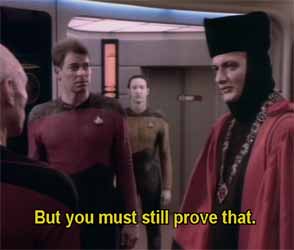 - TNG "Encounter At Farpoint", season 1, episode 1
- TNG "Encounter At Farpoint", season 1, episode 1
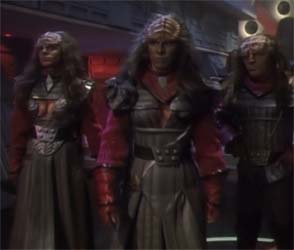 - TNG "Redemption, Part I", season 4, episode 26
- TNG "Redemption, Part I", season 4, episode 26
TNG had several recurring plot threads.
The final two episodes of Next Generation's first season, "Conspiracy" and "The Neutral Zone", seem to have been part of an abandoned attempt at more long-form story-telling. Both seem to be trying to establish some new threat to the Federation (and possibly a shared threat between the Federation and other rival powers such as the Romulans). I think the original idea was for this to become an overarching storyline for the entire series. But the thread from "Conspiracy" was completely dropped, and the destroyed colonies referenced in "The Neutral Zone" were re-written to be retroactive foreshadowing of the Borg's appearance in season 2.
[More]
cddb26c9-ca5a-4327-b199-d0d00dec522b|0|.0
Tags:Star Trek, Star Trek: Deep Space Nine, Federation, Starfleet, progressivism, humanism, secularism, religion, fundamentalism, fascism, terrorism, war, trans-gender, Worf, Odo, Quark, Moogie, Ishka, Bajor, Dominion, Founder, Changeling, Jem'Hadar, Cardassian, streaming television, Game of Thrones, Battlestar Galactica, the X-Files, Babylon 5, Buffy the Vampire Slayer, The Sopranos, Lost, Twin Peaks

The Next Generation, Deep Space Nine, and (depending on who you talk to) Voyager are widely regarded as the "Golden Age" of Star Trek. Since many Trekkies look back at this time period of the late 80's and 90's with the rose-tinted glasses of nostalgia, it might surprise you to read that Deep Space Nine used to be a highly divisive topic among Star Trek fans. Even to this day, I've talked to "hardcore" Trek purists who dislike Deep Space Nine because of how dark and conflict-driven the series is. I can't imagine what these people must think of the Kelvin-verse reboots, Star Trek: Discovery, or Picard. If you think I'm hard on those recent iterations of Star Trek, then you should talk to these people!
In any case, the idea that DS9 is too dark and conflict-driven is a valid criticism from someone coming from the perspective of a fan of The Original Series and Next Generation. Both of those shows were about an idealistic future in which humanity had grown out of its petty squabbles and now seeks to better itself through cooperative exploration and colonization of space. Deep Space Nine didn't quite accept those ideas at face-value. Deep Space Nine's more pragmatic approach had some fans believing that Deep Space Nine violated the spirit of Star Trek.
Many fans of The Original Series and Next Generation criticized Deep Space 9 for being "too dark".
Deep Space Nine was also the first Trek series to be highly serialized, having a singular, overarching plot throughout most of the series, and with frequent mini-arcs running for half a season or a whole season. TNG had its share of recurrent story arcs. Q's "trial of humanity" was pitched as a framing mechanism for the entire show, but ended up only serving to bookend the series, while relegating most of Q's appearances each season as comic tangents. There were other recurrent sub-plots as well, such as Worf's discommendation from the Klingon Empire and his conflict with the Duras House in the "Sins of the Father" arc, the Borg story thread, Data's relationship with his brother Lore, Wesley's training as a Starfleet officer, and a few others. But TNG stayed mostly episodic. Almost all the single episodes of TNG (and the two-parters as a whole) can be enjoyed independently, without having seen any previous episodes of TNG. That was not the case with DS9.
I missed many episodes of DS9 because
it aired on weekend evenings.
DS9 was on the air throughout my elementary school and middle school years (I was seven when the show premiered). It frequently aired (syndicated on Fox in my region) on weekend evenings, and I was often outside playing tag, riding bikes, or playing touch football or street basketball with neighbor kids. As such, I missed a lot of episodes. Due to the highly-serialized nature of the show, when I would see an episode, I would have no idea what was going on! Because I rarely watched the show, and didn't understand it when I did see it, I didn't particularly like it. I'd still watch it, because it was still Star Trek. In fact, Voyager was the first Star Trek series that I watched regularly (it being on Wednesday nights, when I wasn't outside playing), and, well, you all know how I feel about Voyager.
In fact, I grew up with a bit of a preconceived notion that Deep Space Nine was the "bad" Star Trek series -- even though critics at the time largely appreciated it. On the off chance that I could talk about Star Trek with a peer, they generally didn't like DS9 either -- for many of the same reasons.
It wasn't until my college years, when the show was released for sale on DVD that I sat down and watched the whole series from start to finish. At first, I wasn't even sure if I wanted to bother buying the DVDs. After all, DS9 was "the bad Star Trek". So why spend the money? And those DVDs cost a lot of money! CBS wanted something like $120 for a single season, compared to $30 or $40 a season for shows like E.R. or Grey's Anatomy. At least the Next Gen DVDs came in fancy, sturdy boxes. The DS9 DVDs came in cheap, flimsy, rigid plastic booklets that start to fall apart as soon as you open them. I think my mom bought them from Costco for $90 a pop -- a considerable discount, but still obnoxiously expensive!
CBS wanted $120 per season for DS9 DVDs!
I was now older. I was coming to terms with my personal identity as a progressive secular humanist. Most importantly, I could finally follow along with the various multi-episode story threads and the complex, nuanced characterizations. And boy, did my opinions on the series change!
I'll always have a soft spot for Next Generation. That show has my favorite Trek character: Data. And Picard is probably my third favorite character after Spock. After my single favorite episode of Trek, the Original Series' "Balance of Terror", most of my runner-up favorite episodes are TNG episodes. Episodes like "The Measure of a Man", "Who Watches the Watchers", "The Offspring", "The Best of Both Worlds", "Deja Q", "I, Borg", "Tapestry", "The Inner Light", "Darmok", "All Good Things...", and so on...
Despite my fondness for Next Generation, I actually think that Deep Space Nine is the better all-around show.
Every Trek series since the original has taken a couple years to really find its footing. TNG doesn't really figure itself out until midway through season 2, and Voyager takes until the 4th season to figure itself out -- if ever. I don't know if Discovery ever righted its ship, since I didn't bother to watch past the first season, and Picard didn't even become watchable until the third season. I feel like DS9 finds its footing much earlier than TNG or Voyager. Deep Space Nine's characters, themes, and stories start to fall in place by the end of season 1. In fact, one of my favorite episodes of the entire series (and one of my favorite episodes of Trek in general) is a season 1 episode: "Duet". DS9 is the only Trek series (since the original) for which one of my favorite episodes comes as early as the first season.
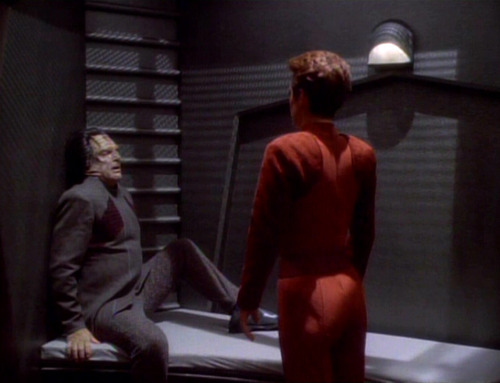 - DS9 "Duet", season 1, episode 19
- DS9 "Duet", season 1, episode 19
One of my favorite DS9 episodes (and Trek episodes in general) is the season 1 Holocaust allegory, "Duet".
The last episode of season 1, "In the Hands of the Prophets" starts to set up the season-long arcs (and a series-long arc) that would become a trademark of the series. That episode introduces us to recurring villain Vedek Winn and starts the process of her gradual accumulation of power, which we'll talk about later.
But despite the series coming together better in the first season, critics of Deep Space Nine aren't wrong when they say that it "feels different" from the Original Series or Next Generation. The show is unarguably darker and more conflict-driven. The entire second half of the series is about an interstellar war, and the seasons leading up to that repeatedly tell stories about domestic terrorism, Holocaust allegories, religious persecution, and cynical politics. These sorts of themes were present in episodes of TOS and TNG here and there, but DS9, at a fundamental level, was about these difficult topics.
[More]
79b833d8-97bd-4e2f-b45e-9f666db1588a|1|5.0
Tags:Star Trek, Star Trek: Deep Space Nine, Gene Roddenberry, Federation, Starfleet, culture, ideals, cooperation, socialism, post-scarcity economics, alien, multi-culturalism, progressivism, humanism, secularism, terrorism, war, Benjamin Sisko, Kasidy Yates, Odo, Quark, Ferengi, Klingon, Cardassian, Dominion, Bajor
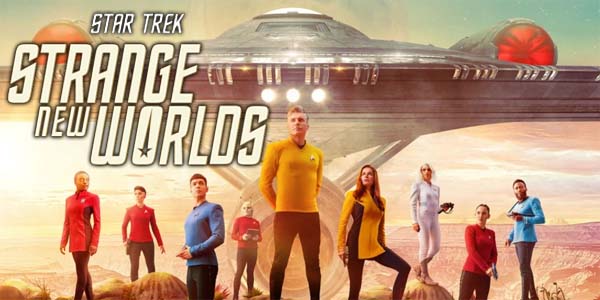
CBS and Paramount are finally learning. After years of trying to force some offensively awful Star Trek down our throats, they've finally given us something palatable. Well, I guess that's not entirely fair. I actually like Lower Decks. But Lower Decks is a self-parody animated comedy, so it's not really "serious" Star Trek, even though it's far more worthy of the franchise than the first season of Discovery or Picard.
Well, now Paramount+ also has a live-action Star Trek show worthy of the name, in the form of Strange New Worlds.
The first episode of Strange New Worlds is much more in-line with what I expect from a Star Trek show. I already talked up the virtues of an episodic format in my Lower Decks review, but focused mostly on how the self-contained nature of episodes allows some to be bad without dragging down the entire season or series with them. But the episodic nature of Lower Decks and Strange New Worlds also highlights another fundamental advantage of the episodic format: those self-contained episodes can tell more high-concept stories.
 © CBS
© CBS
Strange New Worlds is about learning from past mistakes and getting better.
The first episode of Strange New Worlds isn't the most creative or the highest of concept stories, but it's a serviceable story that is true to the spirit of classic Trek, and I'll be spoiling a lot of its plot in the coming paragraph. A first contact goes wrong, and the Enterprise has to be called into rescue the missing crew of a small scout ship. They find a pre-warp civilization that learned to reverse-engineer a warp drive from observing the events of Star Trek: Discovery. Except these people didn't use the technology to build a propulsion device; they're using it to build a weapon that they plan to use to end their own civil war. Realizing that Federation activity has already influenced the cultural development of the planet, Captain Pike decides that General Order One (the non-interference Prime Directive) does not apply. He choses to share the history of Earth's World War III (which this series assumes lies in our real-life immediate future) in an attempt to convince the warring factions to reconcile instead of risk mutual destruction.
Put simply, the first episode of Strange New Worlds differs from Discovery in that it is about preventing a war instead of starting one. It's about learning from the mistakes of past history so that they aren't repeated. And it's a stark warning of what might go wrong in today's society if political tensions don't cool off, without having to depict a future for humanity in which no social progress seems to have happened at all.
It's the type of forward-thinking story that I like about classic Trek, but which is absent from Discovery and especially from Picard (well, the first season anyway). Those shows give us a view of the future in which all the same problems that exist today still exist in 2 or 300 years. Strange New Worlds goes back to depicting a future in which humanity has learned from its past mistakes and improved itself. It's the hopeful, optimistic future that I loved from the older shows. I want to see more modern science fiction depicting futures for its audience to aspire to, instead of all the bleak, dystopian settings that dominate modern sci-fi and makes our future feel hopeless.
[More]
55d95b0e-adc5-437b-b367-2d7d9e457ad6|0|.0
Tags:Star Trek, Star Trek: Strange New Worlds, CBS, Paramount+, USS Enterprise, Christopher Pike, Spock, Nurse Chapel, Uhura, Sam Kirk, science fiction, warp drive, Starfleet, Federation, first contact, Prime Directive, Star Trek: Discovery
Well I'll be damned. This winter, I was pleasantly surprised by The Mandalorian seeming to pull the Star Wars franchise back from the brink of the abyss. And now I'm also pleasantly surprised to see that perhaps Star Trek might be pulled out from circling the toilet bowl as well. The first episode of CBS All Access' new Picard series was surprisingly "not bad".
Now, I do still have some serious reservations about the directions that I think the show might be going later in the season. And I'll get to that later. But first, I want to sit and bask in the delight of having just watched a new piece of Star Trek media that I didn't hate. After slogging through the first season of Discovery (I have yet to watch the second season), I was left with zero faith in CBS's ability to re-capture the spirit and soul of Star Trek.
Picard shows some good faith right from the start by opening with a clip of the Enterprise-D. Not some re-designed Franken-ship monstrosity like the "original" Enterprise in the 2009 Trek reboot, or as seen in Discovery. But the honest-to-goodness Galaxy-class Enterprise-D, pretty much exactly as we remember and love her -- and looking mighty gorgeous, might I add! We then zoom into Ten Forward, where Picard is playing a hand of poker with an unconvincingly digitally de-aged Brent Spiner reprising the role of Data. This scene pays homage to the beautiful final scene of the Next Generation finale "All Good Things...", and Picard laments that he's stalling going all-in against Data's hand because he "doesn't want the game to end".
Picard is a return (and continuation) of Star Trek as fans knew it almost 20 years ago.
We didn't want the game to end either...
The first few scenes of the episode then go on to show Picard giving brief (but impassioned) speeches about the decline of Starfleet ideals, the civil rights of sentient androids, and the moral imperative to provide aid and relief to the Romulan refugees whose home planet was destroyed by the [somehow unexpected?] supernova of the Romulan sun. And he's also trying to do some social justice for pit bull dogs, which (as my choice of pets should suggest) is something that I approve very strongly of. It's respectful and faithful (and reverent) to what came before. "Holy shit", I thought, "this is actually looking and feeling like the Star Trek that I know and love."
For a moment, I thought the soul of Star Trek is there, in those early scenes, even though it is shallow and lacks the idealism that has always underpinned Trek.
... [More]
4aa66485-3b1e-4134-918b-1fb4e47cd38d|1|5.0
Tags:Star Trek, Star Trek: Picard, CBS, all access, science fiction, Jean-Luc Picard, Patrick Stewart, Lieutenant Commander Data, Brent Spiner, USS Enterprise, Starfleet, Romulans, Romulus, refugees, android, civil rights, Borg, Number One, pit bull, dog
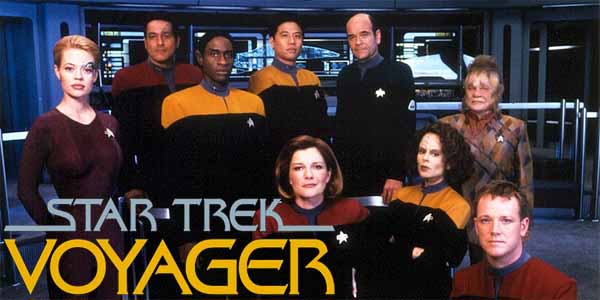
Don't worry, I'm almost done venting my frustrations with Star Trek: Voyager. The first post was about how the show failed to build on its foundations, and the second post was about how the show was a Next Gen copy-cat. This will be the third (and last) post exclusively dedicated to bashing on Voyager. If I decide to write anything further about Voyager, it will probably be about the things that I actually like about the series. I want to re-emphasize that I don't hate Star Trek: Voyager as a TV show. I feel that it was very mediocre, and I'm disappointed that it failed to deliver on its potential.
Even though I don't hate the series as a whole, the one thing that I actually do absolutely loathe about the series is its finale: "Endgame".
Voyager's "Endgame" is a lazy, contrived, cop-out of a finale.
Endgame is one of the worst episodes of Voyager, and might very well be one of the worst episodes in all of Star Trek! OK, it's not "The Omega Glory" or "The Alternative Factor" or "Sub Rosa" bad, but it's pretty terrible! I honestly do not understand how it keeps making lists of "best Voyager episodes". About the only redeeming factor of this episode (in my mind) is that the inclusion of Klingon Captain Korath (and his possession of a time-travel device) indirectly cannonizes Star Trek: the Experience -- and kind of indirectly canonizes me!
"Endgame" is a schlocky action adventure that basically perfectly represents all of Voyager's weaknesses as a show. It's too dependent on its TV-budget CGI Borg special effects. It makes Seven of Nine out to be the most important character on the show (she is the most important character, but the show doesn't have to continually force it down our throats). It's selfish and pretentious. It's fan-servicy.
The inclusion of Captain Korath's time travel device indirectly canonizes Star Trek: the Experience.
"Endgame" is too concerned with its gimmick to really care much about the characters. So much so that it literally manifests a significant (but ultimately arbitrary) romance between two main characters out of nowhere with no build-up at all and in complete contrast to any development that had already been happening. Even the actors thought this romance sub-plot came out of nowhere and blindsided them!
Lastly, "Endgame" is also a rehash of an earlier Voyager episode: "Timeless" (in which Harry Kim goes back in time to save Voyager from crashing), while at the same time trying to be a lazy rehash of TNG's brilliant and beautiful finale "All Good Things..." -- but without the brilliance or beauty.
... [More]
c6c78dcf-37de-431a-b544-93a00cb99a58|4|4.0
Tags:Star Trek, Star Trek: Voyager, U.S.S. Voyager, Endgame, series finale, Delta Quadrant, Starfleet, Borg, Kathryn Janeway, Seven of Nine, Jeri Ryan, Chakotay, Tuvok, Borg Queen, Lyndsay Ballard, Ensign Jetal, Lon Suder, Korath, Star Trek: the Experience, pale blue dot
|

| 12 | | | | | | | 60 | | 11 | | | | | | | 55 | | 10 | | | | | | | 50 | | 09 | | | | | | | 45 | | 08 | | | | | | | 40 | | 07 | | | | | | | 35 | | 06 | | | | | | | 30 | | 05 | | | | | | | 25 | | 04 | | | | | | | 20 | | 03 | | | | | | | 15 | | 02 | | | | | | | 10 | | 01 | | | | | | | 05 |
|